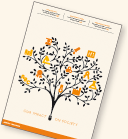Responsible business practice
We believe Pearson has a unique opportunity to make a positive impact in three focus
areas – raising literacy levels, improving learning outcomes and contributing to competitiveness.
In addition, we adopt a broad and holistic definition of 'responsible business' that captures a series of priorities that are common across many industries and individual companies.
These include commitments to:
Environment
Environment deliver against stakeholder expectations on the key area of climate change and to always seek to make better use of resources;
Supply chain management
Supply chain management extend our principles with regard to labour standards, human rights and environmental responsibility to include our suppliers and business partners;
Our people
Our people provide a safe, healthy workplace, where our employees are able to realise their own individual potential and aspirations, and where there is respect for their privacy, dignity and life outside work;
Our customers
Our customers ensure that our products and services are appropriate in content to the age and location of the student and are safe to use; that we provide opportunities for stakeholders to shape usability; and that we uphold the principle of freedom of expression;
Communities
Communities provide opportunities for Pearson people to be good citizens and to get involved in their local communities.
Responsible business practice cuts across all aspects of our company and our focus is to integrate this into the way we manage our businesses. The main issues that we track as part of our broad responsible business practice strategy are:
| Environment | Supply chain management | Our people | Our customers | Communities |
|---|---|---|---|---|
Climate change |
Responsible procurement |
Workforce |
Freedom of expression |
Active citizenship |
Responsible resource use |
Diversity and inclusion |
Editorial independence |
||
Talent management and people development |
Appropriateness of content |
|||
Collaboration and engagement |
Product safety |
Some of these issues are central to our business success; others may be small based on our commercial operations but have the potential to significantly impact our reputation. As we operate in over 70 countries, the relative significance of issues and therefore our responsible business strategy can vary significantly based on varying operational, political, regulatory and customer expectations.
In deciding on our main issues (or assessing materiality, in CR jargon), we took into account:
- Our business strategy and wider developments in public policy;
- What our investors, particularly the Socially Responsible Investment (SRI) community, asked us about. We participate in or are rated by DJSI, FTSE4Good, the Carbon Disclosure Project and many others;
- What stakeholders are telling us. We get feedback from customers and employees in lots of ways including surveys, discussion groups and meetings;
- Assurance and third party assessments;
- Benchmarking against competitors, peers and leaders. We are members of the Corporate Responsibility Group, Business in the Community and the Media CSR Forum.
As our thinking evolves, so we will ask stakeholders how we can improve our broad responsible business practice strategy.
